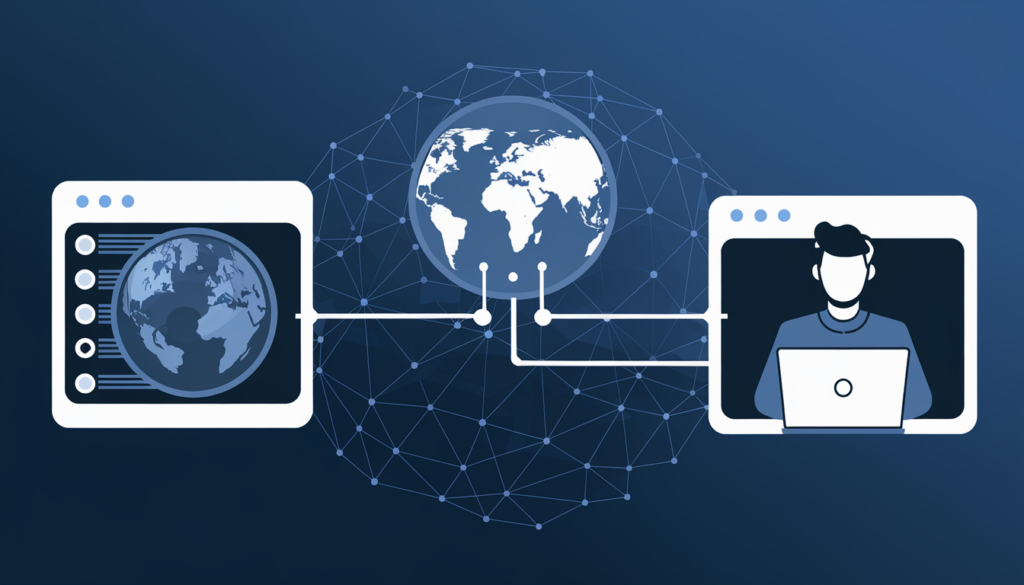What Is a Proxy Server? Benefits and How It Works Explained
Ever wondered what a proxy server is? Think of it as a digital middleman — an intermediary that stands between you and the websites you visit. It routes your internet traffic, masks your IP address, and can improve your security, privacy, and browsing speed.
Cybercrime surged in 2021, with Americans reporting nearly 850,000 complaints across the U.S. Proxy servers are more relevant than ever. They protect your data, boost your internet speed, and unlock region-restricted content.
Let’s break down what proxy servers do, how they work, and why so many individuals and businesses rely on them.
Understanding the Basics of Proxy Servers
A proxy server acts as an intermediary between your device and the internet. When you make a web request, the proxy processes it first and then forwards it to the destination website. It then returns the site’s response to you.
This additional step offers several benefits. It hides your IP address to enhance privacy and caches frequently visited content to improve loading speeds. Additionally, it helps filter or block potentially harmful traffic.
There are several types of proxy servers:
- Forward proxies handle outbound requests from internal networks to the internet, often used in corporate settings.
- Reverse proxies manage incoming traffic, distributing it across servers to optimize performance and protect backend systems.
- Transparent proxies don’t alter your requests and used by schools or libraries for monitoring and filtering.
- Anonymous and high-anonymity proxies offer increasing degrees of user privacy.
- Residential, data center, and rotating proxies vary in speed, authenticity, and use cases, such as web scraping, ad verification, or bypassing geo-restrictions.
Why Use a Proxy Server?
Proxy servers provide a powerful combination of privacy, performance, and access control, making them useful for both individuals and businesses. People rely on proxies for a variety of reasons:
- Privacy: Proxies mask your IP address, making it harder for websites and third parties to track your online activity.
- Access Control: They allow users to bypass geo-restrictions, access blocked content, and filter out unwanted or distracting websites.
- Speed and Efficiency: By caching frequently visited sites and managing network traffic, proxies can improve browsing speed and reduce bandwidth consumption.
- Security: Some proxies offer encryption and block malicious sites, adding an extra layer of protection against cyber threats.
Businesses often deploy proxy servers to monitor and control employee internet usage, secure sensitive company data, and maintain smooth network operations. Meanwhile, individuals use proxies to browse more safely, access region-locked services, and protect their privacy in everyday online activities.

Different Types of Proxy Servers
Proxy servers come in various forms, each tailored for specific tasks, privacy levels, and performance needs:
- Transparent Proxies: Commonly used in schools, libraries, or workplaces to monitor activity. They don’t offer privacy since they reveal your IP address to websites.
- Anonymous Proxies: Conceal your IP address from websites but may still reveal that you’re using a proxy.
- High Anonymity Proxies: Change IP addresses frequently and don’t identify as proxies, offering strong privacy protection.
- Residential Proxies: Route traffic through real devices with legitimate IP addresses, making them harder to detect and block.
- Data Center Proxies: Fast and cost-effective, ideal for large-scale tasks, but easier for websites to identify and block.
- Rotating Proxies: They provide a new IP address with every request, making them perfect for web scraping and automation.
- Reverse Proxies: Protect internal servers by filtering and distributing incoming traffic.
- SSL Proxies: Encrypt data between users and websites for secure communication.
- TOR and I2P Proxies: These offer deep anonymity through decentralized, multi-layered encryption systems for highly private browsing.
Key Benefits of Using Proxy Servers
Proxy servers bring many benefits for both people and companies. They enhance security by acting as a shield between your device and the internet. This reduces the chance of cyber attacks. In fact, 43% of businesses use them to keep sensitive info safe from unauthorized access.
They also improve performance. Proxy servers can make pages load up to 50% faster in busy times. They save bandwidth too, with businesses seeing a 30-50% drop in usage.
Privacy is another big plus. Proxy servers hide your IP address, which is key for private tasks. This is super important for journalists, whistleblowers, and security pros who need to stay hidden online. Proxy servers for security also encrypt data, protecting against cyber threats.
Finally, proxy servers let you access content blocked by location. This is great for streaming services, where what’s available changes by region. Using a proxy can boost engagement with content by 20-30%. The demand for these benefits is growing, with the proxy server market expected to grow 12% each year.
How Proxy Servers Enhance Security
Using a proxy server adds a layer of security. HTTPS proxies, for instance, encrypt web traffic. This keeps sensitive data safe from unwanted eyes. It’s crucial when dealing with financial info or confidential data online.
Proxy servers also block access to harmful websites. This helps prevent malware infections. They offer different levels of anonymity, from high to anonymous. High-anonymity proxies change IP addresses often, offering the best protection against tracking.
Anonymous proxies still hide where you are, but not as well. This is great for businesses doing market research or people wanting to see content from other regions. Combining proxy servers with VPNs and anti-detect browsers creates a strong defense against online dangers. It helps keep your privacy safe in today’s connected world.

Setting Up a Proxy Server
Setting up a proxy server is easy and can improve your online privacy and security. The steps depend on your device and operating system. For Windows 10 users, go to Settings > Network & Internet > Proxy. Here, you can turn on automatic detection or enter proxy settings manually.
Mac users can find proxy settings in System Preferences > Network > Advanced > Proxies. Android devices let you set up a proxy by choosing a Wi-Fi network and going to Advanced Options. Browsers like Google Chrome and Firefox also have their own proxy settings in their menus.
When setting up a proxy server, think about using a Proxy Auto-Config (PAC) file. It makes setting up proxies on different platforms easier and faster. But, be careful with free proxies as they might not be secure. Choose trusted proxy services to keep your data safe.
Setting up a proxy server usually takes just a few minutes. By following these steps, you can make your online activities more private. You might also be able to access content that’s not available in your area.
Proxy Servers and Internet Speed
Proxy servers can change your internet speed in big ways. Knowing how they work helps make your online time better. Premium proxies, with their wide reach, can make your internet faster by cutting down on delays and improving how data moves.
Caching is a big plus for proxy servers. They save the web content you visit often, making pages load much faster. This makes your browsing smoother and helps servers handle less work. Caching proxies can cut down on bandwidth use a lot, saving money for big companies.
The type of proxy server you use matters. Cheap or low-quality proxies can slow you down because they have less bandwidth. But, top-notch proxies keep your connection steady, which is great for tasks that need lots of power. Adjusting your proxy settings, like picking the nearest server, can also make things faster and more efficient.
Some proxy servers might indeed slow things down a bit because they encrypt data. But, this small slowdown is usually not noticeable to users. The goal is to find the perfect balance between speed and security, based on what you need most.
Common Use Cases for Proxy Servers
Proxy servers are key in many online activities. In companies, 70% use them to manage internet access and block certain content. This can reduce bandwidth use by half by caching often visited pages.
People who value their privacy often use proxy servers. With 60% of users concerned about online privacy, proxies help them stay anonymous. This is especially important as big companies like Google and Amazon track online activities.
Content creators and marketers also rely on proxy servers for web scraping. A proxy server for web scraping helps gather data from different IP addresses. This way, businesses can get SEO insights, as only 0.63% of users check the second page of Google search results.
Accessing content blocked in certain areas is another common use. About 40% of businesses use proxies to access this content. It’s useful for both personal fun and business research.
Proxy servers are versatile and popular. They improve online privacy and help with data collection. This makes them a solution for many online problems.
Challenges and Limitations of Proxy Servers
Proxy servers have their downsides. While 70% of companies use them for security, they can slow down your internet. About 40% of users see slower speeds with unsecured proxies because of heavy traffic.
Compatibility problems are common too. Around 25% of companies struggle with proxy servers that don’t fit their networks. This can cause service disruptions and lower productivity. Seventy percent of users worry that companies log their online activities, making privacy a major concern.
Security risks are real. Hackers can exploit about 30% of poorly configured proxy setups. This can leak sensitive data, making using a proxy server risky for data safety. Also, 60% of users might get malware or viruses from ads on free proxies, which are often ad-supported.
Unlock Safer, Smarter Browsing — And Share Content with Confidence
Proxy servers are more than privacy tools — they’re your gateway to a safer, faster, and more open internet. From hiding your IP address to bypassing content blocks and boosting security, they offer real advantages for both individuals and businesses.
But staying secure online also means using trusted tools to manage and share your digital content.
That’s where DivShare comes in. It gives you a fast, secure, and seamless way to store and share files online. With reliable media hosting and privacy-first features, you stay in control every step of the way.
Take the next step toward smarter digital protection. Sign up for DivShare today and start sharing content the secure way.